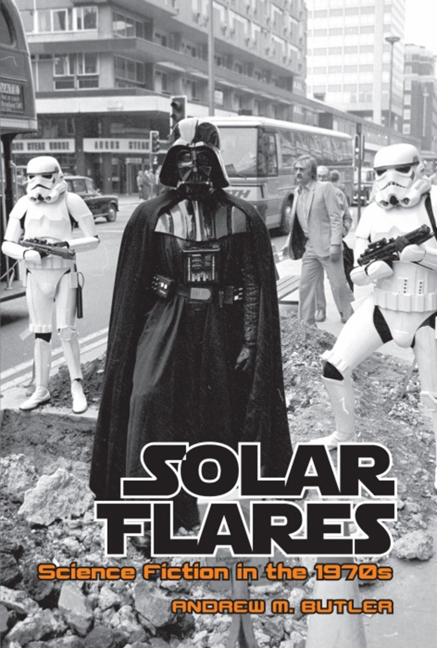Book contents
- Frontmatter
- Dedication
- Contents
- Acknowledgements
- Prologue
- 1 The Ends of First Sf: Pioneers as Veterans
- 2 After the New Wave: After Science Fiction?
- 3 Beyond Apollo: Space Fictions after the Moon Landing
- 4 Big Dumb Objects: Science Fiction as Self-Parody
- 5 The Rise of Fantasy: Swords and Planets
- 6 Home of the Extraterrestrial Brothers: Race and African American Science Fiction
- 7 Alien Invaders: Vietnam and the Counterculture
- 8 This Septic Isle: Post-Imperial Melancholy
- 9 Foul Contagion Spread: Ecology and Environmentalism
- 10 Female Counter-Literature: Feminism
- 11 Strange Bedfellows: Gay Liberation
- 12 Saving the Family? Children's Fiction
- 13 Eating the Audience: Blockbusters
- 14 Chariots of the Gods: Pseudoscience and Parental Fears
- 15 Towers of Babel: The Architecture of Sf
- 16 Ruptures: Metafiction and Postmodernism
- Epilogue
- Bibliography
- Index
3 - Beyond Apollo: Space Fictions after the Moon Landing
- Frontmatter
- Dedication
- Contents
- Acknowledgements
- Prologue
- 1 The Ends of First Sf: Pioneers as Veterans
- 2 After the New Wave: After Science Fiction?
- 3 Beyond Apollo: Space Fictions after the Moon Landing
- 4 Big Dumb Objects: Science Fiction as Self-Parody
- 5 The Rise of Fantasy: Swords and Planets
- 6 Home of the Extraterrestrial Brothers: Race and African American Science Fiction
- 7 Alien Invaders: Vietnam and the Counterculture
- 8 This Septic Isle: Post-Imperial Melancholy
- 9 Foul Contagion Spread: Ecology and Environmentalism
- 10 Female Counter-Literature: Feminism
- 11 Strange Bedfellows: Gay Liberation
- 12 Saving the Family? Children's Fiction
- 13 Eating the Audience: Blockbusters
- 14 Chariots of the Gods: Pseudoscience and Parental Fears
- 15 Towers of Babel: The Architecture of Sf
- 16 Ruptures: Metafiction and Postmodernism
- Epilogue
- Bibliography
- Index
Summary
Millions of viewers had watched the footage of Neil Armstrong stepping onto the moon on 20 July 1969, an event that marked the climax of the space race. The physicist Gerard K. O'Neill notes: ‘Apollo was begun at a time when the mood of the nation was vastly different from now [1976]: then we had confidence in our abilities, we saw our living standards increasing rapidly, our money was sound and we did not yet see limits to our continued growth’ (1978: 128). John F. Kennedy's assassination on 22 November 1963 meant Apollo lost its champion – his successor, Lyndon Baines Johnson, had to continue the programme in homage to his predecessor. Richard Nixon, elected in 1968 and in office in 1969, had no such burden, and was overseeing what had become an expensive land war in Vietnam in addition to other financial problems. O'Neill argues: ‘The late 1960s and 1970s [became] a time of disillusion, of slow economic growth coupled with inflation, and of living standards improving only slowly. [… We] passed through a distrust of anything technological’ (1978: 128). The moon landing was undeniably an American triumph, but repetition dulled the spectacle. Apollo 12 reached the moon on 19 November, but Apollo 13 in April 1970 was nearly a disaster as equipment failed. The days of the programme were numbered. Joe Haldeman recalls: ‘After the first couple of moon shots, Americans were pretty blasé; NBC were showered with complaints when it dared interrupt the Super Bowl to show two clowns walking around on the Moon’ (1993: 156–57). Apollo 17 was the last manned trip in November 1972. Having won a propaganda battle against the Soviets, there was no economic benefit to space travel. A staffed, orbiting satellite, Skylab, was launched on 14 May 1973, but abandoned less than a year later; it was allowed to fall back into Earth's atmosphere in July 1979. The wasteful, expensive Saturn V launchers, which propelled the Apollo lunar landing modules, needed to be replaced by a more economic vehicle, but the first space shuttle mission did not take place until 12 April 1981, and the mixture of scientific and military demands compromised its design. Haldeman blames Nixon's hostility to Kennedy's legacy: ‘The deficiencies of the shuttle are largely the result of Nixonian parsimony’ (1993: 153).
- Type
- Chapter
- Information
- Solar FlaresScience Fiction in the 1970s, pp. 38 - 50Publisher: Liverpool University PressPrint publication year: 2012



